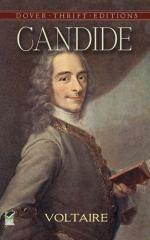|
|
Candide Major Characters
Candide: The young hero of Voltaire's tale, Candide's name suggests his naïve and simple personality. His expulsion from the castle of the Baron Thunder-ten-tronckh sets in motion a search for his darling Cunégonde. During his journey, Candide survives a series of disasters and misfortunes, every step of the way undermining the credibility of Dr. Pangloss's philosophy of optimism.
Cunégonde: The young, beautiful daughter of the Baron Thunder-ten-tronckh, and sweetheart of Candide, her privileged life ends abruptly when Bulgarian soldiers rape and disembowel her and kill her parents. She is mistress to a number of brutal men, and slave to a Transylvanian prince. Though her beauty and charm wither away, Candide fulfills his promise to marry her. She becomes a pastry chef on Candide's farm. The name Cunégonde has historical significance. A woman canonized in 1012 for demonstrating her chastity in a trial by fire was named Cunégonde. Candide's Cunégonde is not so chaste, however.
Pangloss: Philosopher and tutor of Candide and the Baron Thunder-ten-tronckh's children, he teaches metaphysico-theologo-cosmolonigology, a brand of metaphysics promoting the philosophy of optimism. Pangloss states that the world is the best of all possible worlds in which all is well and all is for the best. Though venereal disease almost kills him, though the Spanish Inquisition hangs him (unsuccessfully), and though he witnesses the misfortunes of his fellow men, Pangloss refuses to recant his optimism. His logic is flawed, if not altogether absurd. Pangloss joins Candide and Candide's friends to settle on a farm in Turkey.
The Old Woman: Daughter of the Princess of Palestrina and Pope Urban X, she was once a sought-after and privileged beauty but, like Cunégonde, fate forced her to undergo a series of harsh trials, including enslavement and the loss of one buttock to cannibalistic soldiers.
Cacambo: Candide's loyal valet, Cacambo saves Candide from being skewered by natives in Paraguay, and eventually helps reunite Candide with Cunégonde and the old woman. Cacambo is a kind of cosmopolitan Jack-of-all-trades. He was born in Peru, speaks several languages, and has worked in a number of different capacities, including choir-boy, lackey, and slave to a deposed king. His experience and pragmatism is of great help to Candide. He becomes the household gardener on Candide's farm.
The Baron's son: As Cunégonde's brother, the Baron's son takes after his father, priding himself on his noble lineage. He forbids Cunégonde to marry anyone of lower status, including Candide. After the Bulgarians kill his parents and destroy the castle of Thunder-ten-tronckh, the Baron's son becomes a Jesuit.
Martin: Befriended by Candide in Surinam, Martin follows Candide to France, England, Venice and Turkey. Martin sees through the designs of the Parisian con artists who swindle Candide. His practical cynicism contrasts sharply with Candide's naiveté. Unlike Dr. Pangloss, Martin is devoutly pessimistic. The misery and unfortunate events endured by characters in Candide confirm Martin's pessimism. Martin is also a self-declared Manichaean--one who believes that the universe is composed of opposing realms of good and evil; the human spirit, which is good, struggles to transcend the body which exists in the evil realm.
Minor Characters
His Lordship the Baron Thunder-ten-tronckh: According to Pangloss, the Baron Thunder-ten-tronckh is the greatest baron in the province of Westphalia. He expels Candide from his castle when he sees Candide kissing Cunégonde.
Paquette: A waiting maid of Her Ladyship the Baroness, Paquette contracts a venereal disease from a friar and gives it to Pangloss. She becomes a miserable prostitute.
King of the Bulgarians: He may be a caricature of Frederic the Great, King of Prussia, famous for his successful military campaigns and his strictly regimented army. Due to his patronage of the arts and his interest in literature, he was known as an enlightened ruler. Voltaire spent about three years at his court in Potsdam, but they severed ties after a dispute.
Jacques the Anabaptist: The Anabaptists were a Protestant sect. They believed children can't know the difference between good and evil. They advocated adult baptism instead. Jacques takes care of Candide and Pangloss, and he sails with them to Lisbon. He drowns in the shipwreck.
The Sailor: Rude and irreverent, he survives the shipwreck off the coast of Portugal. Though Jacques the Anabaptist saves him from drowning, the sailor does not return the favor.
My Lord the Inquisitor: The top official of the Spanish Inquisition in Lisbon, he conducts autos-da-fé and shares his affection for Cunégonde with her owner, Don Issachar. Candide kills him.
Don Issachar: A Jew who keeps Cunégonde as his mistress. Candide kills him.
Governor of Buenos Aires: His name and his countenance are a caricature of Spanish pride and nobility.
Negro slave: Missing a hand and a leg, his wretched story inspires Candide to declare that he may have to renounce optimism.
Monsieur Vanderdendur: Owner of the Negro Slave, Monsieur Vanderdendur cut off the slave's leg when he tried to run away. He swindles Candide, steals his red sheep, but meets a suitable end when his ship is attacked by pirates.
Abbé from Périgord: This sly abbot is anything but honest and decent. He dupes Candide in Paris and robs him of his money.
Friar Giroflée: He and Paquette are lovers. He was forced to become a friar by his parents. He spends his money on prostitutes. He settles down and works as a carpenter on Candide's farm.
Lord Pococurante: A Venetian nobleman. In Spanish, his name means 'little care'. He represents bored self-indulgence and hedonism. His eccentric and irreverent views on art, music and literature surprise Candide.




